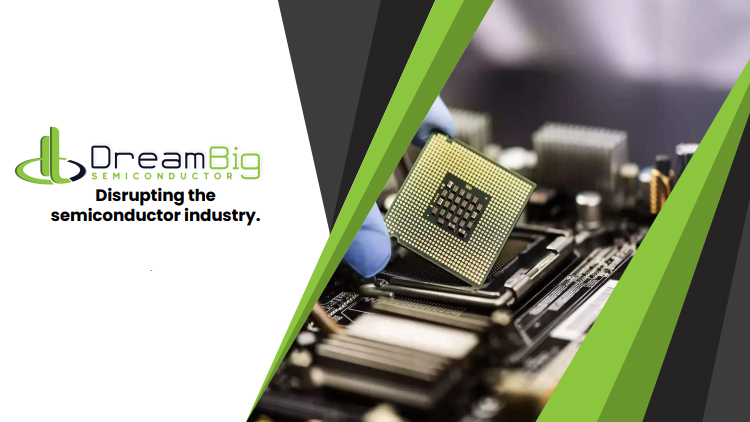 INFRA
INFRA
 INFRA
INFRA
 INFRA
INFRA
Artificial intelligence chip startup DreamBig Semiconductor Inc. said today it has closed on a $75 million equity round of funding, bringing its total amount raised to more than $93 million, according to Crunchbase data.
Today’s round was co-led by the Samsung Catalyst Fund and the Sutardja Family, and saw participation from new investors such as Hanwha, Event Horizon and Raptor, plus existing backers such as UMC Capital, BRV, Ignite Innovation Fund and Grandfull Fund.
Founded in 2019, DreamBig is the creator of the “MARS Platform,” which is a kind of open chiplet platform for developing high-performance semiconductors that leverage advanced, 3D high-bandwidth memory technology.
DreamBig announced the launch of its MARS platform in January. It said it intends to bring to mass market a new generation of AI chips built on open standard chiplets, which are modular integrated circuits.
The startup said the MARS platform will enable customers to focus their investments in silicon on more specific capabilities where they can differentiate themselves from competitors, while taking advantage of the lower costs of the open standard chiplets. So customers, such as chipmakers and server hardware makers, can create computer chips that are laser-focused for specific tasks such as processing generative artificial intelligence, automotive or edge applications, for example.
According to DreamBig, the MARS chiplet standard solves two key challenges faced by many companies trying to build AI servers and accelerators – the problems of scaling up compute and scaling out networking. It overcomes these bottlenecks because, the company claims, it’s the first chiplet that provides direct access to both static random-access memory and dynamic random-access memory tiers. That means it can serve as a platform for compute, accelerator or networking chips, enabling rapid data movement, data caching or data processing, depending on the specific purpose.
DreamBig said the funds from today’s round will be used to accelerate the development of its chiplet standard and commercialize the offering, as well as its Chiplet Hub product, which is a development platform for companies looking to experiment with its chiplets.
Co-founder and Chief Executive Sohail Syed said today’s investment underscores the market’s growing recognition of his company as a “transformative force” in the AI and data center infrastructure market. “Our open MARS Chiplet Platform enables unparalleled scale-up and scale-out solutions so customers can achieve the highest levels of performance and energy efficiency at lowest cost and fastest time-to-market,” he said.
Marco Chisari, who runs Samsung Electronics Co Ltd.’s Semiconductor Innovation Center, said he believes “chiplet-based AI solutions” are the most practical way forward for the AI industry. “The ever-growing demands for intensive workloads and memory-bound applications – from generative AI to automotive – are fueling the need for more advanced chiplet-based designs with 3D HBM stacking,” he said.
DreamBig is just the latest in a string of AI chip startups to have raised millions of dollars in funding this year. One week ago, California-based Halo Industries Inc., which develops a laser manufacturing platform for the semiconductor industry, closed on an $80 million Series B round led by the U.S. Innovative Technology Fund. That came less than a month after another U.S. startup, Etched.ai, announced it had raised $120 million in funding to try and take on Nvidia Corp., the current leader in AI chips.
Last May, the South Korean AI chipmaker DEEPX Co. Ltd., raised $80.5 million in funding for its chips that are optimized for machine learning workloads, while in April, SiMA Technologies Inc. reeled in $70 million to accelerate the development of its processors for industrial robots and edge computing devices. And in February, a company called Recogni Inc. snagged $102 million from investors for its autonomous vehicle-focused AI chips.
.he biggest chip-related funding round of the year went to Black Semiconductor GmbH, which last month revealed it had secured $274 million to support its research into graphene-based chip-to-chip interconnects. At the smaller end of the scale is Innatera Nanosystems B.V., a Dutch chip startup that’s building energy-efficient semiconductor hardware for sensor-based edge applications, which raised $21 million via a Series A round of funding last month.
Support our mission to keep content open and free by engaging with theCUBE community. Join theCUBE’s Alumni Trust Network, where technology leaders connect, share intelligence and create opportunities.
Founded by tech visionaries John Furrier and Dave Vellante, SiliconANGLE Media has built a dynamic ecosystem of industry-leading digital media brands that reach 15+ million elite tech professionals. Our new proprietary theCUBE AI Video Cloud is breaking ground in audience interaction, leveraging theCUBEai.com neural network to help technology companies make data-driven decisions and stay at the forefront of industry conversations.